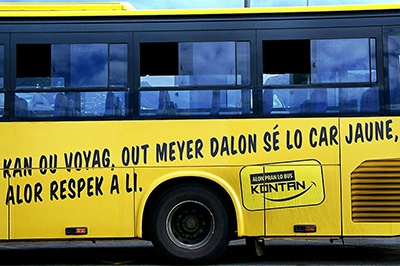 French Linguistic Diversity: Creole languages
French Linguistic Diversity: Creole languages Creole languages: A Francophone melting pot
The Creole languages first appeared during the colonization era; today, they are spoken in about a hundred countries. From the Antilles to French Guyana and the Indian Ocean, French Creole is spoken by approximately ten million citizens.
CREOLISATION, A LINGUISTIC PROCESS
The "Creole language" is often wrongly referred to in the singular form. In fact, there are over a hundred Creole languages in the world. The Creole cultures were borne of a cultural interaction between European emigrants and non-European natives. They are of English (Jamaica, United States), Portuguese (Cape Verde, Guinea-Bissau), Spanish (Philippines), and of course French origins: the most significant French Creole-speaking community lives in the former colonies of the Antilles, French Guyana and the Indian Ocean (Reunion Island, Mauritius, etc.).
A HISTORY ROOTED IN COLONIZATION
The history of Creole languages stems from the era of European colonialism. Starting of the 16th century, the main colonial powers at the time (Spain, France, Great Britain, the Netherlands and Portugal) created various empires around the world.
The slave trade then organized by these powers led to a massive displacement of diverse African populations. To create a common ground, the enslaved populations intermixed their own languages and the language of the colonizer. Over generations, these new dialects and languages went from being a second language to being a primary tongue among the speaking population.
FRENCH CREOLES: SO FAR AWAY, YET SO CLOSE
French Creole, despite its evolution, has a lot in common with modern French. Phonetics, for one. In Martinique, a "nomm" is a man ("homme") and a "gason" is a young man ("garçon"). In Guadeloupe, "espwa" means hope ("espoir") and "enmé" means to love ("aimer"). The lexicon is also still very similar, as 90% of the vocabulary used in former French colonies is derived from French.
Syntax and pronunciation, however, are where the two languages diverge, making understanding often impossible for someone who does not speak Creole. The Creoles have also modified and combined French words and phrases, creating an evocative and poetic language. In Réunion, a "tantine" is a young lady, a "bibine" is a beer, and a "bonbon-la-fesse" (literally "buttocks candy") is a... suppository!
To know more, check out the online Creole dictionary ("Dictionnaire du créole en ligne").

